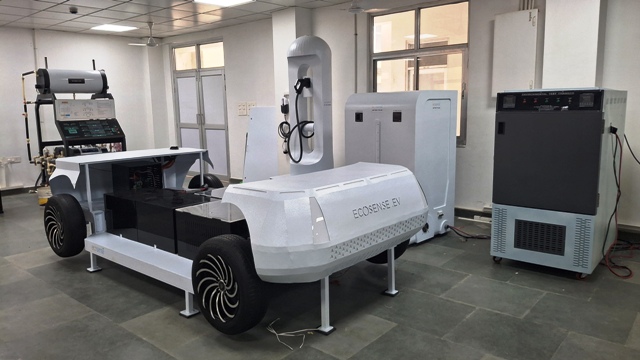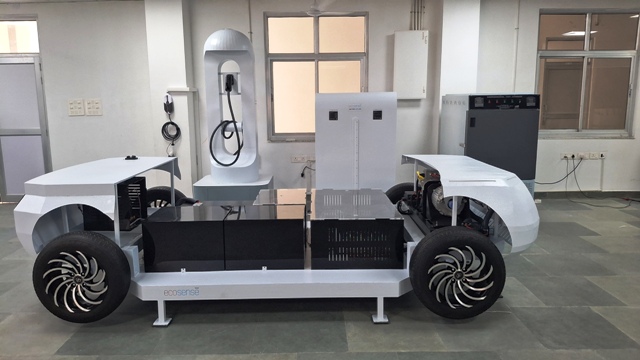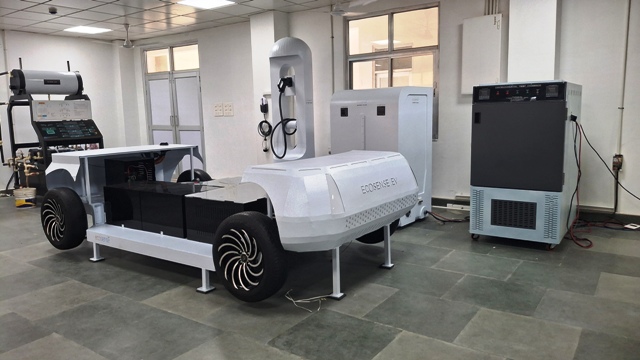Ecosense Establishes Advanced Electric Vehicle Lab at IET Lucknow
Hands-on Learning Platform
for Electric Mobility Aligned with India’s Clean Energy Future

Hands-on Learning Platform
for Electric Mobility Aligned with India’s Clean Energy Future
The Institute of
Engineering and Technology Lucknow in collaboration with Ecosense Sustainable
Solutions has launched an advanced Electric Vehicle Lab at the Department of
Mechanical Engineering. This facility is a significant leap in experiential
engineering education, offering students, faculty, and researchers access to
real-world electric vehicle systems. It bridges academic learning with
practical applications and supports the national agenda for clean mobility.
The lab integrates
renewable energy with EV systems and emphasizes interdisciplinary learning,
helping students gain practical insights into battery technologies, electric
propulsion, and EV charging infrastructure. It creates a vibrant research and
training ecosystem aligned with India’s vision of electric mobility and carbon
neutrality.
The new Electric Vehicle
Lab is part of a unique dual Centre of Excellence in Electric Vehicles and
Green Hydrogen established at IET Lucknow. This centre, supported by a four
kilowatt hybrid renewable energy system on campus, positions IET among India’s
top institutions pioneering sustainable technology education.
This initiative aligns with
India’s commitment to net-zero emissions and aims to produce a generation of
engineers capable of designing and deploying next-generation mobility
solutions. Coverage in The Times of India has highlighted IET’s leadership in clean
energy education, showcasing how academic infrastructure can be built around
emerging industry needs.
The Electric Vehicle Lab is
built around three modular and interoperable systems, each focusing on a core
area of EV technology. These platforms offer in-depth functionality and support
practical training, curriculum integration, and applied research.

This unit replicates an
electric vehicle drivetrain using actual automotive-grade hardware. It includes
a twenty kilowatt permanent magnet synchronous motor, a programmable electric
dynamometer, high-capacity lithium iron phosphate battery, and advanced controllers.
Key Features
By working with this
system, students gain insights into electric propulsion, traction control, and
the efficiency characteristics of motors under dynamic conditions. It prepares
them for roles in electric vehicle design, testing, and systems integration.
The EVSE module provides a
comprehensive understanding of electric vehicle charging systems, both AC and
DC. It includes a three point six kilowatt Type 2 AC slow charger and a fifteen
kilowatt CCS2 DC fast charger, with software and hardware tools to simulate
real-world charging scenarios.
Key Features
This platform helps
learners understand how EV charging works, how chargers communicate with the
vehicle battery system, and how smart charging is implemented for grid
efficiency and user safety.

The Electric Vehicle Lab is
aligned with the AICTE model curriculum on e-Mobility and reflects the National
Education Policy 2020’s emphasis on hands-on, skill-based learning. It supports
a multi-disciplinary approach across electrical, electronics, mechanical, and
computer science engineering domains.
Learning Opportunities
This lab offers a complete
ecosystem for project-based learning, startup incubation, and applied research.
It empowers students and faculty to not only understand electric vehicles but
also innovate and build next-generation technologies in a sustainable
framework.